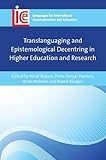Translanguaging and Epistemological Decentring in Higher Education and Research / ed. by Heidi Bojsen, Petra Daryai-Hansen, Anne Holmen.
Material type: TextSeries: Languages for Intercultural Communication and Education ; 39Publisher: Bristol ; Blue Ridge Summit : Multilingual Matters, [2023]Copyright date: ©2023Description: 1 online resource (296 p.)Content type:
TextSeries: Languages for Intercultural Communication and Education ; 39Publisher: Bristol ; Blue Ridge Summit : Multilingual Matters, [2023]Copyright date: ©2023Description: 1 online resource (296 p.)Content type: - 9781800410909
- 404/.2 23/eng/20221121
- P40.8
- online - DeGruyter
| Item type | Current library | Call number | URL | Status | Notes | Barcode | |
|---|---|---|---|---|---|---|---|
 eBook
eBook
|
Biblioteca "Angelicum" Pont. Univ. S.Tommaso d'Aquino Nuvola online | online - DeGruyter (Browse shelf(Opens below)) | Online access | Not for loan (Accesso limitato) | Accesso per gli utenti autorizzati / Access for authorized users | (dgr)9781800410909 |
Frontmatter -- Contents -- Contributors -- 1 Introduction: The Nexus of Translanguaging and Epistemological Decentring in Higher Education and Research -- 2 Translanguaging, Epistemological Decentring and Power: A Study of Students’ Perspectives and Learning -- 3 More Languages for More Students: Practice, Ideology and Management -- 4 Glimpses Into the ‘Language Galaxy’ of International Universities: International Students’ Multilingual and Translanguaging Experiences and Strategies at a Top Finnish University -- 5 Fostering Students’ Decentring and Multiperspectivity: A Cross-Discussion on Translanguaging as a Plurilingual Tool in Higher Education -- 6 Teaching the Conflicts in American Foreign Language Education -- 7 On Matrouzity: Translanguaging and Decentring Plurilingual Practices in Morocco -- 8 Foreign Language Learning ‘in the Wild’ and Epistemological Decentering -- 9 Strategies of Decentring in Translingual Research: Reflections on a Research Project -- 10 Student Testimonies: Translanguaging and Epistemological Decentring from a Student Perspective -- Appendix: Abstracts of Chapters 2-9. A Courtesy for Selective Readers -- Author Index -- Subject Index
restricted access online access with authorization star
http://purl.org/coar/access_right/c_16ec
Using data from universities in Asia, Central and North America, Europe and the Maghreb, this book provides examples of the heuristic value of translanguaging and epistemological decentring, and argues that decentring cannot happen until learners are able to identify which sorts of centring dynamics and conditions are salient to their learning.
Mode of access: Internet via World Wide Web.
In English.
Description based on online resource; title from PDF title page (publisher's Web site, viewed 06. Mrz 2024)


